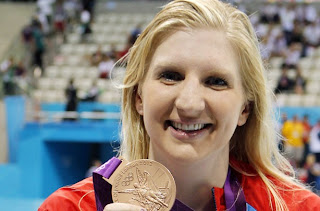Failure, it goes without saying, is a relative concept. For most of us mere mortals, failure is the feeling that creeps over you when you realise you've spent the entire day by yourself on the sofa, eating a whole packet of bakewell tarts and watching Jeremy Kyle reruns.
Olympic athletes, though, are cut from a different cloth. On Saturday afternoon British rowers Zac Purchase and Mark Hunter secured a silver medal in the lightweight double sculls final despite an engineering fault with Purchase's seat which forced a restart. Purchase was physically out on his feet after the race, and had to be propped up by Hunter, so I initially attributed their inconsolable demeanour in the post-race interview to exhaustion. But in his Guardian column, Purchase wrote:
I've never felt so totally and utterly gutted. We were there to win gold, nothing else. Even though I'm holding a silver medal, it still feels completely heart-wrenching. [...] I cannot imagine ever being able to derive any consolation from the race outcome. The whole point about sport is that you have winners and losers. It's important for people to keep that in mind. Getting medals for taking part is not what it's about; it's all about getting medals for winning.
The most obvious echo here is the famous sporting line, often attributed to NASCAR racer Dale Earnhardt: "Second place is just the first place loser". This is sport as Nietzschean struggle, inspired by Pierre de Coubertin's Olympic motto ("Faster, Higher, Stronger") rather than the Olympic creed, which begins: "The most important thing in the Olympic Games is not to win but to take part." The winner takes it all, as Abba put it. The loser takes nothing.
This was clearly a dictum taken to heart by British 400m sprinter Christine Ohuruogu. After forfeiting her Olympic title to the brilliant Sanya Richards-Ross on Sunday night, Ohuruogu said:
I was stunned, I was heartbroken actually. To lose your title like that was tough. I just wish I’d held on to my title — I really wanted to and I fought hard. She didn’t get an easy ride completely, at least I hope I made it hard for her. I always came here for one thing and one thing only and that was continuing my reign so I am disappointed. [...] I know I should be pleased but I’m just stubborn. I’m very stubborn.
In many ways such monomaniacal drive is commendable. Do we want to see British athletes just happy to be there, or do we want to see them win? The anxiety felt during the first couple of days while we waited for a goal medal at London 2012 suggests the latter. But is Earnhardt's line really true? Is second really just the first place loser? Isn't it possible to perform brilliantly but still only finish second or third when pitted against the world's best athletes?
The answer, surely, is yes. In an athletics world of incremental improvement, where diet and training routines and sports science are constantly being refined, there's no shame in finishing second or third. As Liz Nicholl, the chief executive of UK Sport argued, commentators who aren't close to the high performance system think Team GB should be in the mix for every gold, but while we're progressing, so is the rest of the world.
This is what Rebecca Adlington articulated so eloquently in her interview poolside immediately after losing her 800m freestyle crown to 15-year-old American Katie Ledecky. Refusing to play the victim, Adlington said: "I am so proud and pleased to get a bronze medal – it's nothing ever to be embarrassed about. Swimming is one of the hardest sports to medal at. It is so, so difficult and I hope the public realise that."
However, perhaps the fact that Adlington was content with her two bronze medals at London 2012 isn't that surprising. Stanford University professor Bob Sutton blogged this week about the joy U.S. swimmer Brendan Hansen displayed at snaring a bronze in the 100m breaststroke. While Hansen's euphoria was partly down to his age (he was only the thirteenth swimmer to win a medal over the age of 30), Sutton also mentioned a 1995 study for the Journal of Personality and Social Psychology, which suggested strong evidence that athletes are happier with a bronze medal than a silver. Whereas bronze medalists are happy to have made it on to the podium, silver medalists are prone to counterfactual thinking, constantly beating themselves up about how close they were to gold.
As Sutton put it: "silver medalists see themselves as the first loser, while bronze medalists see themselves as the last winner." While that speaks volumes about the mindset of our elite athletes and their relentless desire to win, in the end Adlington was surely right. Silver and bronze medals aren't first and second place for losers, they're a reward for exceptional performance, a reminder that you are among the best in the world at what you do.


